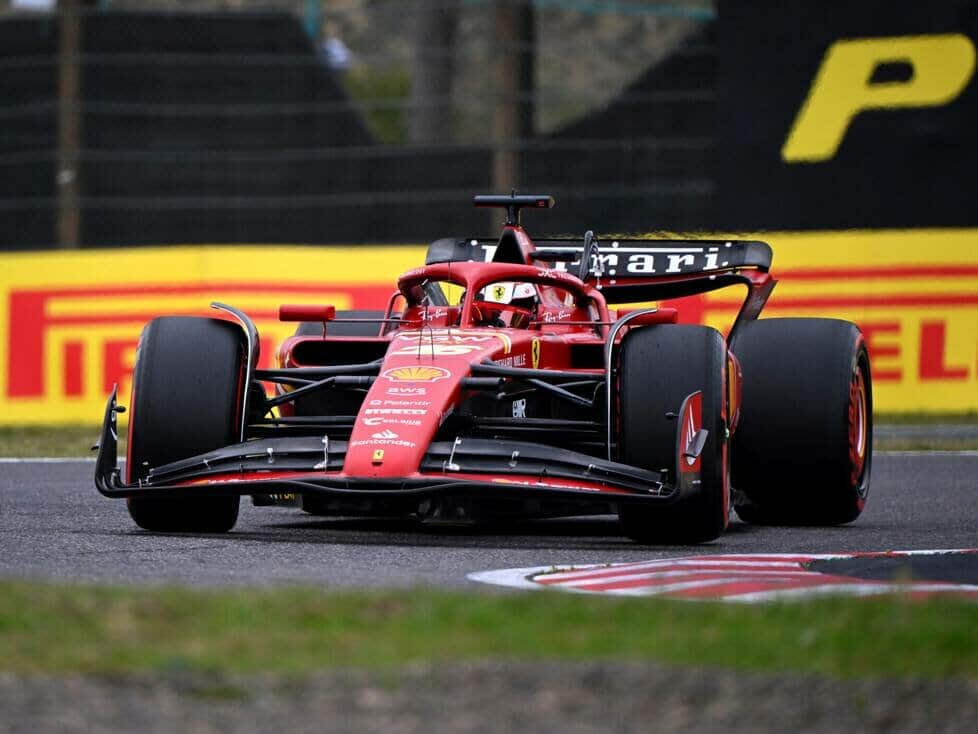Ferrari got closer to Red Bull in the fast corners, but not in the hairpin and chicane, even though they should suit the SF-24
Ferrari is looking for answers to the question of why one of the SF-24’s greatest strengths seems to have suddenly disappeared at the Japanese Grand Prix. The Maranello-based team had hoped that the progress it has made so far in 2024 would allow it to seriously threaten Red Bull in the high-speed chicanes of Suzuka.
Having made good progress on the high-speed corners common at Suzuka, the track would be a good litmus test of how much progress the team had made. And although the team managed to reduce the gap to Red Bull from 0.665 seconds in 2023 to 0.485 seconds now, the progress still left a feeling of dissatisfaction.
Perhaps key to the feeling that they could have improved further was the fact that much of the gap to Red Bull was not in the high-speed areas that they had focused on. Instead, it was in the slow corners, where Ferrari are traditionally strong.
Analysis of the GPS data comparing Max Verstappen’s pole position lap with that of Carlos Sainz shows that most of the gap between the two cars is in the slow areas
Where Sainz loses the lap time to Verstappen
Sainz comes out of turn 2 a tenth of a second behind and only loses another tenth of a second until the hairpin, where he drops another tenth in a corner. From then until the chicane, the gap between the two cars is very small. At Spoon and on the straight down to the 130R, he even gains a little, leaving him three tenths behind.
But in the chicane, all his efforts are in vain, as he loses another tenth in this section alone. A comparison of Ferrari’s best laps this year and last year shows that the Ferrari is slower in the hairpin and chicane this year – suggesting that something has changed in its approach to slow corners.
A tenth of a second here and there may not seem like much, but when the field is as competitive as Formula 1 is at the moment, it makes a lot of difference. Which is why Ferrari says it needs to understand what’s happening. Speaking to Sky, team boss Fred Vasseur explains: “In all the sessions we had big problems at turn 17, the last chicane before the finish line.”
“That created the gap to Max and we need to talk about that. We are talking about a tenth between ninth and fourth place, and that is a question of details. We need to focus on that and understand why we are losing so much time on the last corner. It will be important to find out for the race because traction will be the key. There is only one straight with DRS, so we need to solve this problem.”
The current generation of Formula One cars is causing endless headaches for teams when it comes to the compromises needed to provide downforce at different speeds, and it could be that Ferrari’s pursuit of high-speed wins has compromised its low-speed advantage.
Leclerc: “Are further away than we thought “
However, Charles Leclerc, who was annoyed by a lack of grip in qualifying, believes things are a little more complicated than that: “We’re further away than we thought. So yes, maybe the characteristics of the car don’t suit Suzuka as well as the Red Bull,” he says.
“But it’s a bit strange because I think in the long runs we are pretty good. But on a single fast lap we were nowhere today. So that tells me it’s probably mainly down to the tires if that’s the case.”
But there is another truth that Ferrari cannot ignore: While Verstappen constantly grumbles about Red Bull’s performance at low speeds, this is actually an area where the team excels.
As McLaren team principal Andrea Stella points out, everyone seems to have caught up in the high-speed area. But Red Bull’s strength is more than that: “Everyone has improved in the high-speed area compared to Red Bull, but I think Red Bull has kept an advantage in terms of the straights at the same time,” he explains.
“And they are also very good at all other speeds. If you take the hairpin, they have the best car. So ultimately it’s just the group of features you have in your car that makes the lap time,” Stella explains.





